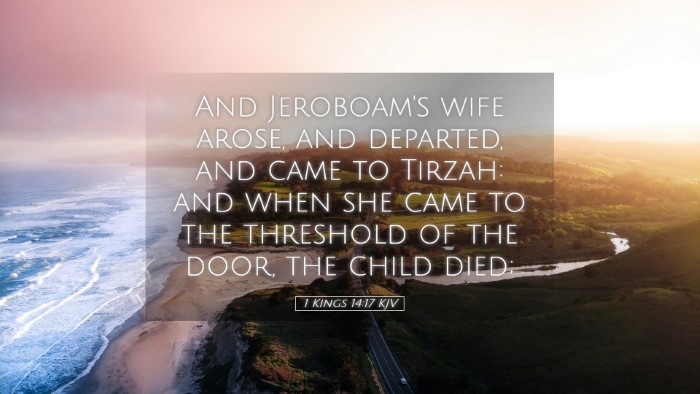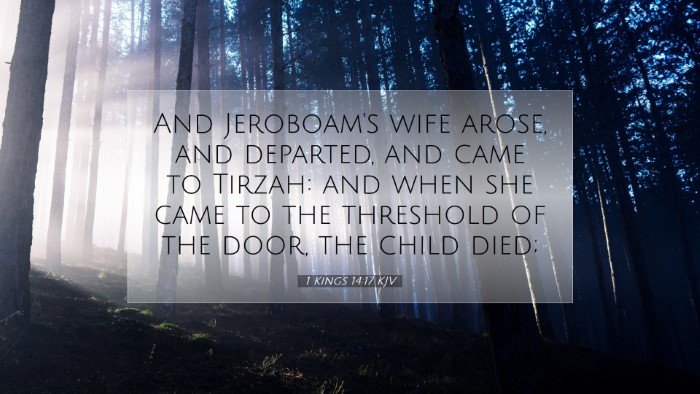Commentary on 1 Kings 14:17
Verse: "And Jeroboam's wife arose, and departed, and came to Tirzah: and when she came to the threshold of the house, the child died."
Introduction
This verse is situated in a significant narrative within the reign of Jeroboam, the first king of the northern kingdom of Israel. It encapsulates a poignant moment that reflects the themes of judgment, prophecy, and the consequences of sin. The mother of the sick child, whose fate is entwined with the divine judgment upon Jeroboam's house, becomes a central figure in the unfolding drama.
Contextual Background
The background to this event is essential for understanding its gravity. Jeroboam, having led Israel into idolatry with the establishment of golden calves at Bethel and Dan, provoked the anger of God. As a result, the prophet Ahijah had pronounced judgments upon him and his descendants, indicating the dire consequences of turning away from Yahweh.
Public Domain Commentary Insights
Matthew Henry's Commentary
Matthew Henry emphasizes the symbolic nature of the child's death as indicative of the judgment pronounced upon Jeroboam. The act of Jeroboam’s wife disguising herself to seek a word from the prophet Ahijah highlights the lack of authenticity and the pretense associated with their worship. Henry notes that her coming to the prophet signifies a desperate search for hope against the backdrop of divine disapproval.
Albert Barnes' Notes
Albert Barnes focuses on the consequences faced by Jeroboam’s household due to their choices. He points out that the death of the child serves as a confirmation of God’s stern warning. Barnes posits that the child’s demise illustrates not only the personal tragedy of the family but the broader implications of a kingdom that has turned its back on God. He also highlights the emotional weight of this moment, as a mother is left to grapple with the loss.
Adam Clarke's Commentary
Adam Clarke offers a detailed exploration of the implications of this event. He draws attention to the child’s death as a direct fulfillment of prophecy, reiterating the seriousness of God's word through His prophets. Clarke remarks on the historical context of Jeroboam’s rule and the sociopolitical turmoil in Israel during this time. The demise of the child, whose name is often believed to be Abijah, symbolizes the end of any hope for Jeroboam’s legacy, leaving the family and nation shrouded in darkness.
Theological Reflections
This narrative allows for a deep theological reflection on the nature of God’s judgment and mercy. It presents the truth that sin has profound consequences, not just for the sinner but for their families and communities. This theme resonates throughout Scripture, revealing the interconnectedness of individual actions and collective outcomes.
Judgment and Mercy
The death of Jeroboam’s child can be viewed through the lens of both justice and mercy. While it signifies judgment, it also serves as a warning to others about the dangers of turning away from God. The death evokes the compassion of God toward those who may still seek Him, even amidst failures. God’s interventions, as seen through the prophet Ahijah, underline the possibility of redemption and the hope of restoration for those willing to repent.
Practical Applications
For pastors, students, and theologians, this passage provides a rich ground for teaching and reflection:
- Call to Authenticity: The attempt of Jeroboam's wife to disguise herself symbolizes the futility of pretense in our relationship with God. It urges leaders and congregants alike to approach God with genuine hearts.
- Understanding Consequences: The narrative prompts a discussion about the consequences of leadership decisions, particularly in the church today. It encourages leaders to consider the broader ramifications of their actions.
- Emotional Responses: The verse evokes a deep emotional response, reminding us of the human aspects of biblical narratives. It calls us to empathize with those in grief and explore pastoral care for families facing similar tragedies.
- Hope in Judgment: Finally, the passage encourages the faithful that judgment can lead to restoration. While judgment may be severe, God's ultimate intentions lean towards correction and redirection for His people.
Conclusion
In summary, 1 Kings 14:17 serves as a poignant reminder of the consequences of sin, the seriousness of God’s judgment, and the complexities of divine mercy. Through the insights gleaned from various commentators, we gain a multifaceted understanding of the historical, theological, and practical dimensions of this passage. As contemporary believers, we are called to reflect upon our own paths and ensure that our lives align with divine will, remaining ever vigilant against the distractions of idolatry and sin.


